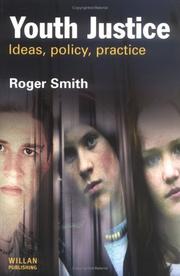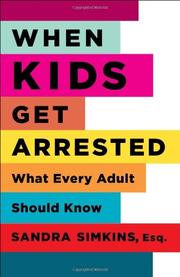| Listing 1 - 10 of 874 | << page >> |
Sort by
|

ISBN: 1843920212 Year: 2002 Publisher: Cullompton Willan
Abstract | Keywords | Export | Availability | Bookmark
 Loading...
Loading...Choose an application
- Reference Manager
- EndNote
- RefWorks (Direct export to RefWorks)
Book
ISBN: 9781138721371 9781138721319 9781351761215 1351761218 113872131X 9781351761222 1351761226 9781351761208 135176120X 9781315194493 131519449X Year: 2019 Publisher: Abingdon, Oxon ; New York, NY : Routledge,
Abstract | Keywords | Export | Availability | Bookmark
 Loading...
Loading...Choose an application
- Reference Manager
- EndNote
- RefWorks (Direct export to RefWorks)
"At a time when Europe is witnessing major cultural, social, economic and political challenges and transformations, this book brings together leading researchers and experts to consider a range of pressing questions relating to the historical origins, contemporary manifestations and future prospects for juvenile justice. Questions considered include: - How has the history of juvenile justice evolved across Europe and how might the past help us to understand the present and signal the future? - What do we know about contemporary juvenile crime trends in Europe and how are nation states responding? - Is punitivity and intolerance eclipsing child welfare and pedagogical imperatives, or is 'child friendly justice' holding firm? - How might we best understand both the convergent and the divergent patterning of juvenile justice in a changing and reformulating Europe? - How is juvenile justice experienced by identifiable constituencies of children and young people both in communities and in institutions? - What impacts are sweeping austerity measures, together with increasing mobilities and migrations, imposing? - How can comparative juvenile justice be conceptualised and interpreted? - What might the future hold for juvenile justice in Europe at a time of profound uncertainty and flux? This book is essential reading for students, tutors and researchers in the fields of criminology, history, law, social policy and sociology, particularly those engaged with childhood and youth studies, human rights, comparative juvenile/youth justice, youth crime and delinquency and criminal justice policy in Europe"--
Book
ISBN: 0674043367 9780674043367 9780674030862 0674030869 0674267168 9780674267169 Year: 2022 Publisher: Cambridge, MA
Abstract | Keywords | Export | Availability | Bookmark
 Loading...
Loading...Choose an application
- Reference Manager
- EndNote
- RefWorks (Direct export to RefWorks)
What should we do with teenagers who commit crimes? In this book, two leading scholars in law and adolescent development argue that juvenile justice should be grounded in the best available psychological science, which shows that adolescence is a distinctive state of cognitive and emotional development. Although adolescents are not children, they are also not fully responsible adults.

ISBN: 1280492503 9786613587732 0813548187 9780813548180 9780813546384 0813546389 9780813546391 0813546397 9781280492501 6613587737 Year: 2009 Publisher: New Brunswick, NJ
Abstract | Keywords | Export | Availability | Bookmark
 Loading...
Loading...Choose an application
- Reference Manager
- EndNote
- RefWorks (Direct export to RefWorks)
Every year, millions of children across the country get arrested. What most adults do not know is that the juvenile justice system has become much more punitive in the last fifteen years. No longer is juvenile court a place where regardless of what happens you get a clean slate when you turn eighteen. Today almost every adjudication of delinquency is accompanied by adult-style fingerprinting, prior record score points, and DNA tests that can stay in a state repository for years. For every stage of the justice system, from arrest to expungement, When Kids Get Arrested gives "top tips" to help adults make the best choices to protect children from long-term negative consequences. Sandra Simkins provides straight answers to common questions such as: Should I let my child talk to the police without a lawyer? How can I help my child succeed on probation? Should my child admit to the charges or take the case to trial? How will this case impact my child's future? Will it prevent him from getting a job or going into the army? My child has mental health issues. Can the juvenile justice system help? My daughter is out of control. Should I call the police? My son got arrested at school and is now suspended. What should I do next? Simkins takes complicated legal concepts and breaks them down into easy-to-understand guidelines. She includes information on topics such as police interrogation, detention hearings, and bail, along with state-by-state specifics. When Kids Get Arrested is a perfect resource for parents, social workers, guidance counselors, teachers, principals, coaches, and anyone else who works with children.
Book
ISBN: 1633212629 9781633212626 1633212610 9781633212619 Year: 2014 Publisher: New York
Abstract | Keywords | Export | Availability | Bookmark
 Loading...
Loading...Choose an application
- Reference Manager
- EndNote
- RefWorks (Direct export to RefWorks)
Book
ISBN: 1908162988 1908162996 9781908162991 9781908162984 9781909976153 9781909976146 Year: 2015 Publisher: Hampshire, England : Waterside Press,
Abstract | Keywords | Export | Availability | Bookmark
 Loading...
Loading...Choose an application
- Reference Manager
- EndNote
- RefWorks (Direct export to RefWorks)
Book
ISBN: 1479800309 147984389X 9781479843893 9781479800308 9781479898800 1479898805 Year: 2015 Publisher: New York, NY
Abstract | Keywords | Export | Availability | Bookmark
 Loading...
Loading...Choose an application
- Reference Manager
- EndNote
- RefWorks (Direct export to RefWorks)
A New Juvenile Justice System aims at nothing less than a complete reform of the existing system: not minor change or even significant overhaul, but the replacement of the existing system with a different vision. The authors in this volume—academics, activists, researchers, and those who serve in the existing system—all respond in this collection to the question of what the system should be. Uniformly, they agree that an ideal system should be centered around the principle of child well-being and the goal of helping kids to achieve productive lives as citizens and members of their communities. Rather than the existing system, with its punitive, destructive, undermining effect and uneven application by race and gender, these authors envision a system responsive to the needs of youth as well as to the community’s legitimate need for public safety. How, they ask, can the ideals of equality, freedom, liberty, and self-determination transform the system? How can we improve the odds that children who have been labeled as “delinquent” can make successful transitions to adulthood? And how can we create a system that relies on proven, family-focused interventions and creates opportunities for positive youth development? Drawing upon interdisciplinary work as well as on-the-ground programs and experience, the authors sketch out the broad parameters of such a system. Providing the principles, goals, and concrete means to achieve them, this volume imagines using our resources wisely and well to invest in all children and their potential to contribute and thrive in our society.
Book
ISBN: 392904112X Year: 1997 Publisher: Köln : Kölner Appell e.V.,
Abstract | Keywords | Export | Availability | Bookmark
 Loading...
Loading...Choose an application
- Reference Manager
- EndNote
- RefWorks (Direct export to RefWorks)
Book
ISBN: 0898850339 Year: 1981 Publisher: New York (N.Y.) : Human sciences press,
Abstract | Keywords | Export | Availability | Bookmark
 Loading...
Loading...Choose an application
- Reference Manager
- EndNote
- RefWorks (Direct export to RefWorks)
Book
ISBN: 0195536134 Year: 2000 Publisher: Oxford : Oxford university press,
Abstract | Keywords | Export | Availability | Bookmark
 Loading...
Loading...Choose an application
- Reference Manager
- EndNote
- RefWorks (Direct export to RefWorks)
| Listing 1 - 10 of 874 | << page >> |
Sort by
|

 Search
Search Feedback
Feedback About UniCat
About UniCat  Help
Help News
News